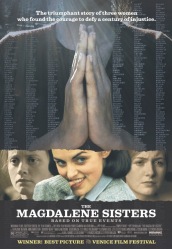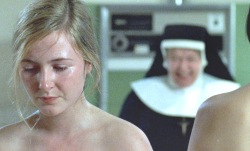|
The Magdalene Sisters
|
| |
 |
UK/USA, 2002. Rated R. 119 minutes.
Cast:
Anne-Marie Duff, Nora-Jane Noone, Dorothy Duffy, Geraldine McEwan, Eileen
Walsh, Mary Murray, Britta Smith, Frances Healy, Eithne McGuinness, Phyllis
McMahon, Rebecca Walsh, Chris Simpson, Daniel Costello
Writer: Peter Mullan
Music: Craig Armstrong
Cinematography: Nigel Willoughby
Producer: Frances Higson
Director: Peter Mullan
LINKS
|
Read the AboutFilm
feature profile and interview with Peter Mullan.
 f The Magdalene Sisters wasn't based on a true story, you wouldn't believe
it. Women locked up in convents for having premarital sex…or even just thinking
about it? In Western Europe? In the Sixties?
f The Magdalene Sisters wasn't based on a true story, you wouldn't believe
it. Women locked up in convents for having premarital sex…or even just thinking
about it? In Western Europe? In the Sixties?
Un. Be. Lievable. Preposterous. Laughable. Even in a staunchly Roman Catholic
country like Ireland. This is the time of Van Morrison (okay, he's from Northern
Ireland), just a decade and a half before U2 and the Boomtown Rats, in a modern
country that over the last ten years or so has been the fastest growing economy
in Western Europe. This is not the 12th century.
Yet locked up women were, becoming slave laborers in the Magdalene Asylums,
convents that doubled as laundry service businesses. Meet three such women—Rose
(Dorothy Duffy), Margaret (Anne-Marie Duff), and Bernadette (Nora-Jane Noone).
Rose has just shamed her parents by giving birth out of wedlock. The baby is
handed off to adoptive parents like a bag of produce, and a distraught Rose
is shipped off to the Magdalene Sisters. Margaret, meanwhile, has the appallingly
bad taste to be raped by her cousin in a back room during a wedding reception.
Off to Magdalene with her. Bernadette is guilty merely of making eyes at the
boys on the street outside of the orphanage where she has grown up. She obviously
intends something disgraceful, so away to Magdalene with the little temptress.
They must all atone for their sins via servitude.
Their new home turns out to be a house of horrors. Jack-booted nuns, led by
brutal convent commandant Sister Bridget (Geraldine McEwan), capriciously demean
and punish the inmates, beating them and even forcing them to strip naked in
order to take turns cackling at their physical flaws. Discarded by their families
and thwarted in their escape attempts, the girls are in serious danger of scrubbing
dirty sheets at Magdalene their entire lives, even though the legality of such
an incarceration appears hazy. Some of the other girls, like slow-witted Crispina
(Eileen Walsh of When Brendan Met Trudy), are even worse off, having
been broken after years of abuse. She is an especially poignant character who
believes she can converse with her son through the St. Christopher medals they
both wear.
The Magdalene Sisters is one of those films where there is no danger
of confusing the protagonists and the antagonists. Films such as this tend to
be one-dimensional. How despicable those nuns are! How terrible for those girls
to suffer such cruelty! Except in the instance of Katy, a woman confined and
brainwashed by the Sisters for so long (forty years) that she has become their
most loyal tool, there is little exploration of the sexual repression and religious
paranoia that could create such creatures as these sadistic nuns. They're just
evil. If you prefer your moral dilemmas delineated in shades of gray, where
different perspectives are examined and blame is difficult to assign, then The
Magdalene Sisters may not be your kind of film.
No doubt, what happened to the victims of the Sisters of the Magdalene Order
is wrong. However, two hours of, "This is wrong!" can be difficult to bear.
What makes The Magdalene Sisters much better than a censorious browbeating
is the girls themselves—well-defined individuals with different quirks
and secrets. Margaret, Bernadette, and Rose each respond differently to incarceration
and must find a different way of enduring. Quietly strong Margaret is simultaneously
the most cerebral and the most empathic of the three leads, even declining an
easy escape at one point, possibly to stay to follow through on a revenge plot
against one of Crispina's tormentors. Rose, having been deprived of her son
but still going through a new mother's biological and hormonal changes, is much
more emotional and passive, while Bernadette's defiant and baleful glares dominate
every scene she's in.
Of the women who play the three, Anne-Marie Duff is the only actor with any
experience, having appeared briefly in Enigma and some television series.
Writer/director Peter Mullan (Orphans), a fine actor in his own right
(Session 9; The Claim) who
appears in a cameo as the domineering father of a girl named Una (Mary Murray),
coaxes excellent performances, even from the amateurs. Except for Noone, who
perhaps flashes her eyes a little too exaggeratedly sometimes, it is impossible
to detect any "acting." Hers is a tough role though, conveying both anger and
fragility, often concurrently. Walsh's role as a good-hearted simpleton gradually
driven mad is even more difficult. The scene when she finally snaps as an unintended
consequence of Margaret's reprisal is one of the high points of the film.
Mullan told AboutFilm in a recent interview that he was inspired by a documentary
he saw several years ago on the Magdalene Laundries. Apparently, the Sisters
of the Magdalene Order's labor camps, thought to have housed tens of thousands
of women, thrived until the 1970s, when automatic laundry machines and increasing
public scrutiny began forcing them out of business. We in America might fail
to appreciate just how strong a grip the Catholic church had over the national
psyche and culture in some countries until very recently—and still does
in places—but the Church's refusal to acknowledge or discuss its scandals
should come as no surprise.
Mullan wanted to make a film about the wrongs done in the name of the church
and the women's ordeal. The Magdalene Sisters is a Serious Issue movie,
and like most Issue movies, it tends to overemphasize its points. It wants to
educate and shock, not to discuss. The message is more important than the narrative.
Nonetheless, the narrative is well-constructed, with clear story arcs for each
of the central characters and a downbeat but satisfying ending, enhanced by
cinematographer Nigel Willoughby's truthful lens and cinema verité style. Or
rather, digital video verité style.
Although The Magdalene Sisters is too busy being outraged to leave audiences
with anything more complex than, "I can't believe that happened!" it is difficult
to envision a more powerful portrayal of the punishments some women endured
just for being sexual creatures. Perhaps, in this instance, that is enough.
If this is what went on in Ireland as recently as the 1960s, all is forgiven,
Sinead O'Connor. Rip up all the photographs of the Pope you like.
Review
© July 2003 by AboutFilm.Com and the author.
Images © 2003 Miramax Film Corp. All Rights Reserved.


